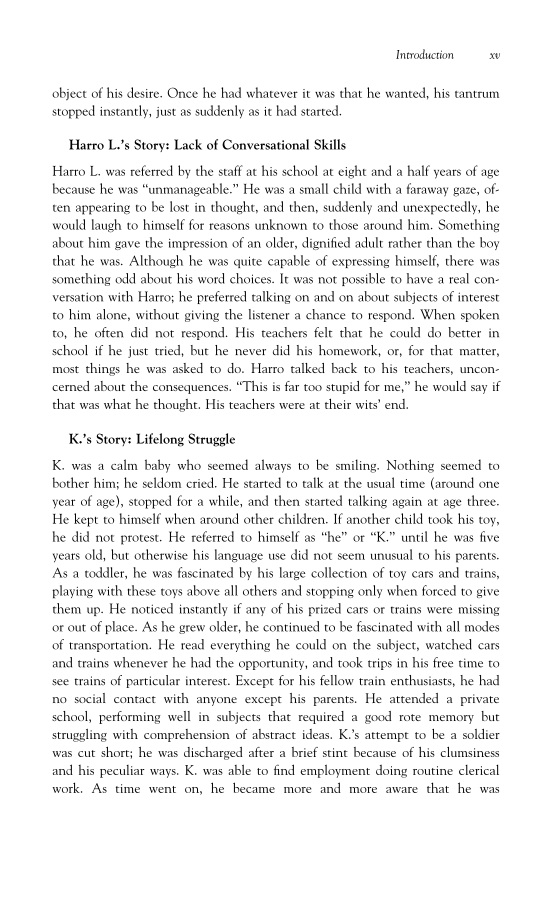object of his desire. Once he had whatever it was that he wanted, his tantrum stopped instantly, just as suddenly as it had started. Harro L.’s Story: Lack of Conversational Skills Harro L. was referred by the staff at his school at eight and a half years of age because he was ‘‘unmanageable.’’ He was a small child with a faraway gaze, of- ten appearing to be lost in thought, and then, suddenly and unexpectedly, he would laugh to himself for reasons unknown to those around him. Something about him gave the impression of an older, dignified adult rather than the boy that he was. Although he was quite capable of expressing himself, there was something odd about his word choices. It was not possible to have a real con- versation with Harro he preferred talking on and on about subjects of interest to him alone, without giving the listener a chance to respond. When spoken to, he often did not respond. His teachers felt that he could do better in school if he just tried, but he never did his homework, or, for that matter, most things he was asked to do. Harro talked back to his teachers, uncon- cerned about the consequences. ‘‘This is far too stupid for me,’’ he would say if that was what he thought. His teachers were at their wits’ end. K.’s Story: Lifelong Struggle K. was a calm baby who seemed always to be smiling. Nothing seemed to bother him he seldom cried. He started to talk at the usual time (around one year of age), stopped for a while, and then started talking again at age three. He kept to himself when around other children. If another child took his toy, he did not protest. He referred to himself as ‘‘he’’ or ‘‘K.’’ until he was five years old, but otherwise his language use did not seem unusual to his parents. As a toddler, he was fascinated by his large collection of toy cars and trains, playing with these toys above all others and stopping only when forced to give them up. He noticed instantly if any of his prized cars or trains were missing or out of place. As he grew older, he continued to be fascinated with all modes of transportation. He read everything he could on the subject, watched cars and trains whenever he had the opportunity, and took trips in his free time to see trains of particular interest. Except for his fellow train enthusiasts, he had no social contact with anyone except his parents. He attended a private school, performing well in subjects that required a good rote memory but struggling with comprehension of abstract ideas. K.’s attempt to be a soldier was cut short he was discharged after a brief stint because of his clumsiness and his peculiar ways. K. was able to find employment doing routine clerical work. As time went on, he became more and more aware that he was Introduction xv
Document Details My Account Print multiple pages
Print
You have printed 0 times in the last 24 hours.
Your print count will reset on at .
You may print 0 more time(s) before then.
You may print a maximum of 0 pages at a time.
















































































































































































































































































